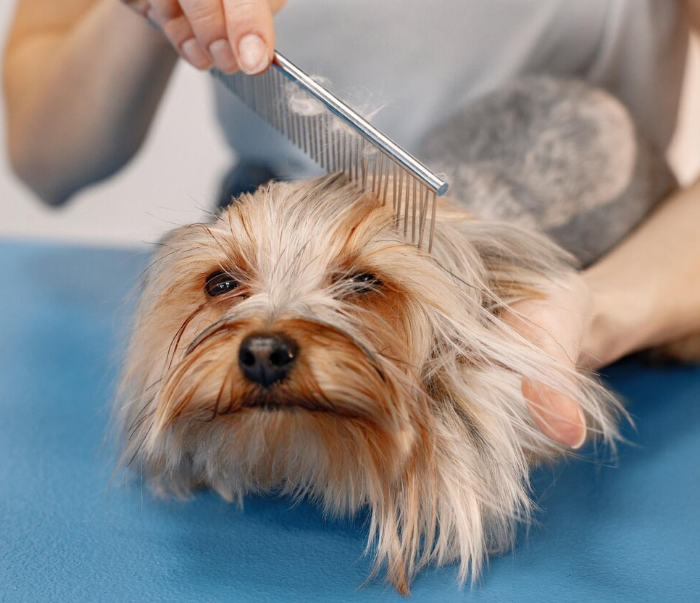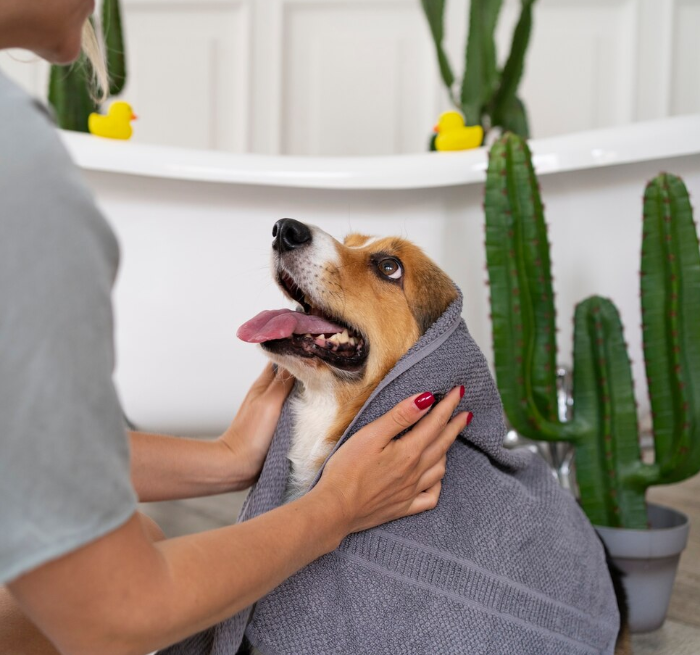2024-05-06
All dog and cat owners are familiar with the sound of their paw friend scratching their skin. Occasional scratching is quite in order, however, sometimes it may look so vigorous that we start to worry.
Our beloved dogs and cats often suffer from itchy skin, causing them discomfort. Itchy skin can result from various factors including allergies, parasites, or underlying health issues.
As responsible pet owners, it is important to understand the causes of itching to be able to apply effective treatment and provide relief. It is essential to address not only the symptoms but also the causes.
Today, we will explore the causes of itching in our dogs and cats and will give you guidance on how to address this issue.
Allergies are among the most common causes of itchy skin in our paw friends. Dogs and cats can be allergic to various factors in their environment, including food; shampoos; plants they have been in touch with; certain cleaning products; grass pollen; certain fragrances, etc.
Just like humans, dogs and cats can suffer from seasonal allergies too. Itchy skin, swollen eyes and/or ear infections are common symptoms of seasonal allergies.
Cats are more likely to get fleas than dogs, so itchy skin in your feline friend may be a sign of fleas.
There are several common reasons for fleas to prefer cats:
- Cats spend much time grooming themselves, which makes it easier for fleas to infest them during the process. If your cat licks their fur excessively, they are more likely to inadvertently ingest fleas or their feces which can contain flea eggs. This can result in parasite ingestion, causing flea-related issues.
-Cats are more likely to roam outdoors playing, and chasing small animals and insects, or simply exploring the environment. This makes them more prone to fleas.
- Fleas prefer warm and humid environments. Cats often look for cozy spots like carpets, upholstery, and bedding, which offer a suitable environment for fleas.
-Some flea species may prefer cats in particular, e.g. the cat flea Ctenocephalides felis, which often infests domestic cats.
Fungal or bacterial infections can also lead to itchy skin. If you notice persistent itching, accompanied by other symptoms like redness, or a very unpleasant odor (foul-like), there is a high likelihood of your cat or dog having an infection. You should consult a veterinarian immediately so that they can make a diagnosis and administer treatment.
Dry skin can be caused by various environmental factors such as low humidity, sunburns, very high temperatures, etc.
These factors contribute to developing hot spots on our pets’ skin (areas of inflammation and infection) which can be very itchy.
Also, dogs and cats with light-colored furs are more likely to suffer from sunburned skin, which can be very itchy and painful.

Regular brushing helps remove dirt and potential allergens, prevents matting, and keeps your pet’s fur clean and neat. It is an essential preventive measure for maintaining a healthy coat and skin, especially if your paw friend is of a long-haired type.
Some of the most common dog breeds that require regular brushing are: the Poodle, The Bichon Frisé, the Shih Tzu, the Afghan Hound, the Old English Sheepdog, and the Yorkshire Terrier.
Cat breeds that are also considered high maintenance are the Persian, the Birman, and the Himalayan.
Our paw friends need occasional bathing based on their breed and lifestyle.
Unlike dogs, cats clean themselves naturally, so they require less bathing than dogs. Many veterinarians even do not recommend bathing for cats at all unless it is needed, i.e. if the cat has spent much time outdoors, has dirt or potential toxins/allergens stuck in their fur, or if due to a medical condition, they can not groom themselves.
Dogs, on the other hand, require bathing more frequently- usually every few weeks up to three months. If your paw friend enjoys splashing around and playing in puddles, then regular bathing will be needed.
A balanced diet is crucial for our pets’ overall well-being, including their skin’s health. It is advisable to opt for high-quality pet food, which is rich in essential nutrients, including omega-3 fatty acids (for a shiny coat and healthy skin), protein, amino acids, minerals, and vitamins.
Don’t forget to consult with a veterinarian who will recommend a diet suitable for your pet adjusted to their age, breed, health, and lifestyle.
Just like a balanced diet, proper hydration is also essential for the overall well-being of our beloved dogs and cats and their skin’s health. Ensuring that your furry friend stays hydrated will help maintain healthy skin.
You should provide fresh, clean water at all times, especially in the summer. Make sure that both their food and water bowls are easily accessible, and clean.
Proper hydration should not be neglected, as it helps remove toxins and supports skin elasticity.
Environmental control is an important aspect of keeping your pet healthy. By creating a pet-friendly environment and minimizing potential allergens, you will help your paw friend stay healthy.
You should clean your home regularly, paying close attention to areas where your pet spends most of the time. Wash your pet's bedding, toys, and any other pet supplies frequently to eliminate dust, mites, and other potential allergen triggers.
Placing an air purifier to reduce dust and pollen can also be helpful.
Regular veterinarian visits are crucial for early detection of any underlying health issues that may contribute to itchy skin and other symptoms.
A veterinarian can do skin exams, run allergy tests, and recommend preventive treatments based on your pet's individual needs.
Going to regular vet visits will help address potential problems on time, so they don’t escalate.

Oatmeal is known for its soothing properties. It contains compounds that reduce inflammation and provide relief from irritation.
You can help your paw friend get rid of itchy skin by preparing a nice oatmeal bath for them. It is recommended that you use pet-specific oatmeal shampoos or consult your veterinarian for recommendations.
Alternatively, you can grind plain oatmeal until it has a powder-like texture and add it to your paw friend’s bath. Ensure the water is slightly warm (skin temperature), and gently massage the mixture into your pet's coat before you rinse it thoroughly.
In cases of mild itching, e.g. bug bites and mild rashes, a hydrocortisone cream can be very useful. You can apply it to the affected area to relieve itchiness and discomfort.
A generic hydrocortisone cream for humans is considered safe for dogs and effective in reducing inflammation.
However, we would recommend that you consult a veterinarian before using it. They will advise you on the correct dosage and can recommend alternative products based on your paw friend’s condition.
You may wonder if your dog or cat would enjoy drinking tea...Actually, in the context of itchy skin, herbal tea will have a bit of a different use.
Based on your dog’s size, you might fill up a sink or tub with warm water and put a few herbal tea bags. Let them soak for several minutes. After you remove them, give your paw friend a nice bath for a few minutes.
If this seems to be a bit challenging or in case the affected area is very small, you can let a tea bag (or a few tea bags) soak in a cup filled with hot water for several minutes. After it has cooled, you can apply the liquid to the itchy skin area.
The use of this widely distributed plant can be traced back to 5000 years B.C. Its great anti-inflammatory and antioxidant properties, along with wound healing and anticancer effects, make it a preferred tool for both topical and oral use.
When discussing itchy skin in our pets, you can provide relief by applying a small amount of pure aloe vera (without alcohol, chemicals, or added ingredients) to the affected spot. Ensure that your dog or cat does not lick it.
Apple cider vinegar is known for its natural soothing effect on dry, itchy skin.
It is believed to have antiseptic and antifungal properties. However, due to its high acidity, you should dilute it in water and apply it to a small skin patch first to see if there are any negative reactions.
Coconut oil has a wide use in cosmetics due to its great properties! It can be very beneficial for both humans and animals due to the relief it provides for dry and itchy skin. It can also help with eczema and allergies.
You can store the oil in the fridge or in any place that is dry and cool until it has a hard texture. Apply it with gentle massaging movements to the itchy skin of your pet for quick relief.
If you use it regularly, after some time, you may notice a difference in your dog’s/cat’s skin appearance. It is likely to have become more moisture and healthy.
However, similarly to apple cider vinegar, it is recommended to start with a small amount and observe how your pet’s body reacts. This will help you rule out potential allergic reactions.
Consult a veterinarian regarding adding fatty acids like omega-3 and omega-6 that also have anti-inflammatory properties and contribute to improving your pet’s coat and skin.
Do not add supplements on your own, if you are not sure about the correct dosage, and always talk to a professional first.
In cases of severe itching, your pet’s veterinarian may prescribe medications like antihistamines or steroids to control inflammation and provide relief. Always follow the vet's recommendations regarding dosage and administration.